|
 The Awning
2008
Frank Auerbach
b. April 29, 1931
_______________________
Stimulations
arranjames
-synthetic_zero
(....)
The infinite demands for the finite neurocognitive resource of attention- which is a form of bodily comportment to the world- provide a ceaseless stream of attentional-demand on brains that can’t meet it. Navigating the contemporary urban environment, and not necessarily even that of the megapolis, even sitting in a cafe, presents one with hundred of flashing signs, adverts, audio-transmissions, moving images, and so on and so on, a cacophony of signs and a chaos of noise, accelerating, multiplying, a plethora upon a plethora overlaid and overlapping that are superimposed on the physical environment with its own denizens such that the nervous system had evolved to cope with. The pathogenetic potential of this rests on these moving images, bodies and roaring sounds that activate our hominid survival networks, drawn as they are to sudden movement, to rushes of sound and in full autonomic efficiency our bodies- which are ourselves- carry out how many assessments of threat a day, a week, a month, a lifetime? And the genius of pharmaco-capitalist production is that it produces its own consumers through the techniques of marketing.
(....)
We live in a ‘dark age of appetites‘ and passions. This “dark age of appetites” is a fantastic way of talking about the contemporary scene. Whenever we do politics we need to do so tactically, provisionally and entirely from within a perspective that recognises this dark age; an age in which democracy and the passions can’t communicate except in the sense of the distribution of bodies in (il)legitmate times and spaces. The passions can be made to speak: the pathologised ways of being are often seen in those signs and symptoms that are themselves characterised by the sign-use (ie: alogia; pressured speech; disorganised speech of all varities- word-salad, loose associations and non-sense). What is interesting about the democracy of someone like Jacques Ranciere is its lack of form and its explosive core of refusal- the identification of a wrong, the contesting of meanings and of material-aesthetic partitions. Of course the riot of 2011 that haunt me- “us”?- were evidence and enaction of the “dark age of passions”…this is a much better formulation than the “sad passions”… yet the problem of Ranciere is his verbosity, his over appreciation- in line with much of the continental tradition, and indeed of the profession of philosophy itself, carried out as it is by paid and sometimes tenured wordsmiths. I am more interested in the demands that bodies in space can make prior to the political demands that they might formulate. In this respect the dark age of passions is an age of inarticulate demands, demands at the level of the body and therefore they are visceral demands, a visceral politics that refuses the level of representation and constitution. If this is the anarchic moment that must be celebrated, an immanent anarchism that can’t be done away with or forgotten, the question nonetheless remains that of organisation. Even dark passions must be organised, must be cultivated like programmable matter.
...(more)
_______________________
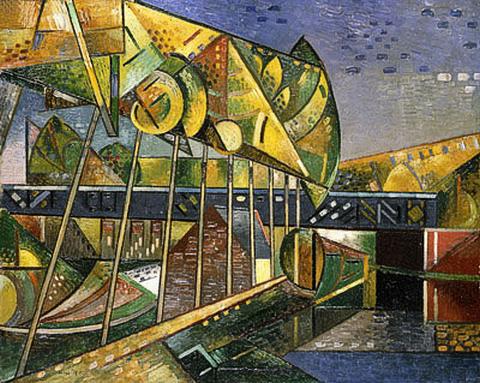
Iron Bridge
1911
Auguste Herbin
b. April 29, 1882
_______________________
"Beyond good and evil for once!"
"Authorized transgressions" and women in wartime
Gaby Zipfel
Translation by Susan Richter
eurozine
(....)
It is a decisive prerequisite for being able to record the practice of exerting sexual violence in war to break with this narrative of self-evidence/unavoidability and shared responsibility in favour of a perspective that examines where, when and how women and men encounter each other in war,[42] how men and women are positioned and what scripts of sexual availability versus sexual self-determination determine the attitudes of the players in war.
Gender stereotypes function so as to secure a certain social order. They belong to the deep structures of social knowledge, in which what is everyday and presumably natural is stored – unscrutinized circumstances that are "known" intuitively, but seldom reflected upon, let alone questioned. To these unquestioned circumstances must be attributed the role violence plays in the structuring of social relationships, and in this case, relations between the sexes especially. Against this background, the perpetration of sexual violence – be it contingent on a space of opportunity, or specifically integrated in combat operations – can be read as a means to position oneself as superior to a defeated victim/enemy. It is neither self-evident nor unavoidable, nor indescribable – it can be described and detected as a tried and true means to an end.
...(more)
_______________________

Empire Cinema
Frank Auerbach
_______________________
Walk poems
A series of reviews of walking projects
Louis Bury and Corey Frost
jacket2
In collecting reviews of recent walking projects, we therefore aimed to place these projects in conversation with one another, even if only implicitly. Rather than simply requesting reviews, however, we wanted to offer reviewers a chance to respond to the work under consideration as we had, by creating a slant form of review. Some reviewers took us up on this offer — to our delight and some degree of surprise — while others preferred to write more traditional reviews, not without surprises of their own. The result is an overview, necessarily inexhaustive, of recent work done in the realm of peripatetic art. Just as we encouraged reviewers to wander in their approach to reviewing, we also encouraged them to consider a diverse array of topics and texts in diverse forms. And the people we invited on this group excursion were writers we like who have also done some wandering on their own.
_______________________

Landscape at Céret
Auguste Herbin
1919
_______________________
Michael Davidson: Four Poems from Bleed Through, plus one other
presented by Jerome Rothenberg
Bad Modernism
Michael Davidson
Suddenly all is / loathing (John Ashbery)
and there’s plenty to be unhappy about
if I can just get the reception area festooned
in time for their arrival, paper cups
and those little plastic whatsits so that,
gorged on meaning,
they troop through the glass doors
seeking interpretation, first floor
mildly historical, second floor
desire matrix, parents accompany
their indiscretions straight
to the penthouse, and someone
hands them a phone, “turtles”
they’re called, heads bobbing
as though they had a choice
to be party favors, deep structure
on your left, follow the clicking
to a white cube, we only work
part time, the other part
we illustrate profound malaise,
...(more)
Bleed Through
New and selected poems by Michael Davidson coffee house press
Michael Davidson: Five New Poems

Léonard Misonne
1870 - 1943
1 2 3 4
_______________________
What does and what doesn’t come to pass
Jean Portante
Translation from French by Zoë Skoulding
presented by Jerome Rothenberg
Of what does or doesn't come to pass the shadow is
it seems to me the least experienced ghost. Not
that between the two the double witness like someone
who’d decided to incline one ear or freeze his
breath would remember what had happened. I'm not
sure that that anything did happen when snow
not usually given to ascent rose again despite
the obstacle of clouds. Rose again to where
one might ask.
Or what's snow doing
when instead of falling it rises. Or why
wouldn't another ghost well up from what
does or doesn't come to pass and slide down
there into winter and here into words. And why
would this ghost slide into words here.
.
In the dust of what's been when what sticks is
not flour but a thickness of days that neither
rain nor shadow knows how to decipher – in this
dust it survives at two steps from itself the village
that the mountain overhangs. Far much too far away
at the centre of a kitchen where wheat has long since been
replaced by steel and steel by memory the meal
prepared is the only cure for the loss of
forgetting.
There’s an unseen crack in the side of the
mountain. On the hill opposite the ruin and the distant
castle know the story. They’re also up there in the sky
the ruin and the crack. And there even in the side
of your skin. You could say a scarred lake. You could say
nothing had been sewn up after the operation.
.
...(more)
_______________________
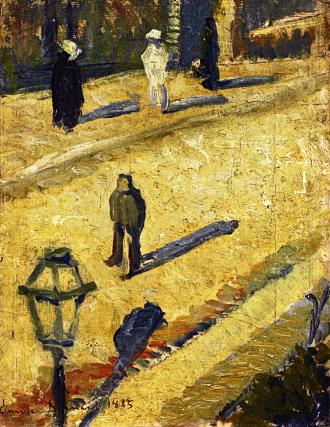
Émile Bernard
b. April 28, 1868
_______________________
E-Literary Text in the Nomadic Cockpit
Janez Strehovec
electronic book review
New mobile technologies shape the way people communicate and perceive reality. Our basic position is the nomadic cockpit (expression coined by the author of this essay) in terms of one being armed with many of the navigating and controlling mobile screenic devices (from cell phones and tablets to consoles, cameras, and various players). When we move around in our surroundings armed with such devices we steadily perceive the data shown on the screen of such a device, which means that both the visual and aural interfaces are integrated in our experience of walking or riding through the environment. Virtual data approaching from the remote context on the screen are related to and coordinated with our basic, non-mediated perception from the physical here and now. Such a digital technology, provoking one’s hands on controls activity becomes incorporated in the experience and understanding of our being on the move.
The focus on mobility and the corporeality addressed by it is close to the cultural shift in contemporary philosophy, where the linguistic, discursive and textual give way to the material, biological, life, event-driven, and post-political (Negri; Agamben; Virno; Thacker). By shifting the focus on life, biopolitics and the body, the political issues that concern movement, feelings, affects, and broader perception issues are also highlighted, particularly with regard to the art and (new) media (Hansen; Massumi). (....)
In the present, it can be seen that an individual’s path is a function of data being received in real time via mobile screenic devices, including the individual’s nomadic cockpit. On the path from point A to point B the individual has an incoming call, which she directs to point C. When she reaches that point there is no guarantee that she will then direct herself to the original destination of point B, but might keep going towards point D, based on a received call or other crucial information, for instance, about the road and weather conditions, which she looked up on the mobile screenic device. The individual’s path is a journey, constantly interrupted and modified by different pieces of information and feedback loops. Such a trajectory is non-linear, the contingent, the speeded-up by means of technological advances that occur in networks, in which the flow of data is too fast for the cause-and-effect way of behavior and thinking.
...(more)
_______________________
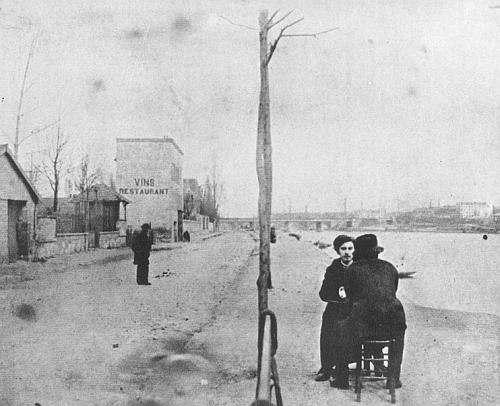
Bernard and van Gogh
Asnières
1886
_______________________
Letter To The World 3: Bloat & Float
Mark Sargent
exquisite corpse
What if you didn’t understand anything you said? Okay, plenty of these folks wandering around already, either god-drunk or scrambled and fried. All of the above? What I mean is, you’ve got the same consciousness, thoughts, emotions, but when you open your mouth what comes out is utterly incomprehensible. And I don’t mean some Papua New Guinea sub-tribal tongue or Basque backwards, but more akin to the lingo of another planet, maybe an entirely different set of phonics, but anyway, completely beyond understanding. You just wake up one morning and this is the case. Same fucking world and everyone around you is also rocking this impenetrable noise, only they can dig it. But not you, although you seem to be functioning. Maybe I’m just describing a type of schizophrenia? Oliver Sacks probably has too many of these patients all jabbering at each other, debating current events, sorting out the world, hell, the universe. But take another example, Angela Merkel, for instance. We understand what she’s saying, the implications of it and why, but she acts like she doesn’t. Or rather, she seems convinced that we can’t penetrate below the bullshit level, can’t see that she’s a shill for financial interests that do not take ours into consideration. She has a lot of company in this affliction, most anyone standing before a microphone and a video camera has contracted this condition.
...(more)
_______________________
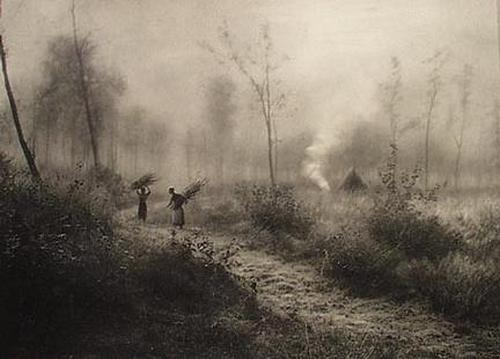
Collecting Kindling
Léonard Misonne
1930
_______________________
Death of the PostHuman: Essays on Extinction, Vol. 1
Claire Colebrook
Open Humanities Press
(....)
In the case of literary modernism we can be even more specific: modernism could emerge and have being only because it made a claim to life, but this claim was destructive of life in its actual self-maintaining modes and appealed to another life, beyond organic survival. Key to this joyous atavism was a disdainful attitude towards the textual archive, alongside a recognition of deep archival forces. As a literary movement, modernism needed at once to regard the textual archive as so much noise and dead weight; at the same time, modernism could only take hold not by producing more literary life but by deadening the textual corpus that was at its disposal. One would read texts not as extensions or expressions of life, but as detached fragments with an odd afterlife. There is, I will argue, something to be gained—today more than ever—by reading modernism not as vitalism but as murderous textual annihilation. Further, this counter-vital modernism of the dead letter is best read through the supposedly vitalist work of Henri Bergson. If modernism were to be reread not as a lament on the infertility and deadening of the West, with the implied goal of revitalization of the word, but as a creatively destructive movement of willed extinction, then several consequences would follow. First, we would need to rethink both postmodernism and post-structuralism, given that both these movements are rendered possible by a certain response to modernism. Second, a new sexuality of modernism would emerge that would be essentially queer. (That is, it would be by deflection, divergence, deviation and dehiscence—and not reproduction—that modernist writing would operate: at once destroying the archive while allowing new archival forces to emerge.) To make this second point more clear and specific, I'd like to begin with the counter-thesis of modernism as a vitalism, with the underlying sexual (and racial) normativity that any vitalism or privileging of life would entail.
(....) .
It is true that Bergson regarded the cinematic camera as the ill of the modern eye: we carve the world into so many snapshots, and then regard the world as nothing more than a collection of unified images, forgetting that the frozen image is a lesser cut in a complex and intensive ‘open whole’ that cannot be reduced to a collection of distinct atoms or moments. But Delillo’s style here takes a certain strand of modernism and carries it forward into the perceptual power of the machine; the slowed down frames of Hitchcock’s Psycho allow the human eye to experience durations and angles not its own. That perceiving eye, in turn, allows for a mode and style of writing that is not the linear narrative of a novel, but closer to a haiku, as if composed forces yield a certain meter that allows writing to form. If Bergson’s modernism challenged the human point of view of subjects representing objects and did so by suggesting that intuition might find other durations, he also opened a tradition of writing that would not rest easily with its own structures and systems but would—through encounters with other perceptions—strive to think, from within language, of rhythms beyond language.
I would suggest that Bergson’s formal method of intuition, whereby perception in the present decomposes the evolved forms of experience to disclose the tendencies from which bounded and organic life has emerged, enables a genealogy of the future. If we slow down the frames through which the world is given—not assuming one whole life of interconnected unity, but an open whole of divergent and incompossible potentials—then what has taken to be posthuman (or the vanquishing of our own being to perceive life as such in its full reality) may be surpassed by the counter human. Living beings are at once emergent from life and at war with life if life is defined as temporal progression towards complex and self-maintaining systems. If, however, there is no such thing as life as such—if there is only an ongoing war between bounded complexity and unbounded dissolution—then we will be compelled to confront the human stain: ‘man’ cannot erase himself, for he has always composed himself as self-erasure, as a being who can become nothing more than a life and world that he properly perceives. It is precisely this stain of non-erasure or the awareness of our geological mark on the time of life that may enable us to think a future that is neither post-human nor human so much as superhuman. If humans exist it is through a deflection of survival, a strange torsion of being at once closed off from life while at the same time claiming to be nothing more than life: this history of the human as an oscillation between self-formation and self-destruction rather than the joyous and blind declaration of the post-human provides a thought for the future beyond our assumed right to life.
...(more)

"Hip Hip Hoorah"
1949
Karel Appel
b. April 25, 1921
in celebration of my 65th today
_______________________
Dream Amid Bed-Woods
Bill Knott
You must pull down sheets from these linen trees,
Blankets too, a pillowcase in full leaf,
But can’t: to snooze amidst their fruits, beneath
The sheath of that composite canopy’s
Roost, you must raise yourself past hammock heights—
Up where its deepest roots feel doubly sapped,
The dormitory orchard might lie wrapped
And ripe with you, whose foliage still invites
More lure of surface sleep. But must you trust
The ease in these boughs, the sway of whose loft
So often now wakes vows to never rest,
To somehow remain alow, to resist
All berth above: you must push off this soft
Palleted grove, this tall, forest mattress.
_______________________
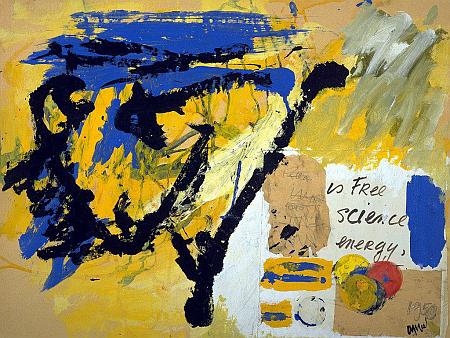
Energy
Karel Appel
1950
_______________________
To the Emblematic Hourglass of My Father’s Skull
Bill Knott
The night that dies in me each day is yours:
Hour whose way I stare, yearning to terra
Firma my eye. There. Where a single hair
Would be a theater curtain I could cling
Behind, dreading my cue, aching to hear
What co-hurrah. More, more of leaves that fall
Consummate capsules, having annaled all
Their veins said! Printout printemps. And yet
(Altars our blood writes a blurb for god on)
Can one ever envy enough his skeleton’s
Celebrity. Can any epitaph
Be adequate repartee for your laugh.
Days lived by me each night say less than it.
While sleep in ounces weighs me wanting.
John Cotter: Comment & Selection of Bill Knott Poems
Bill Knott (1940-2014) at the Poetry Foundation Three Poems by Bill Knott
berfrois
_______________________

Questioning Children
Karel Appel
1949
_______________________
The Importance of Kindness:
An Animation of George Saunders’ Touching Graduation Speech
(....)What I regret most in my life are failures of kindness.
Those moments when another human being was there, in front of me, suffering, and I responded…sensibly. Reservedly. Mildly.
Or, to look at it from the other end of the telescope: Who, in your life, do you remember most fondly, with the most undeniable feelings of warmth?
Those who were kindest to you, I bet.
But kindness, it turns out, is hard — it starts out all rainbows and puppy dogs, and expands to include . . . well, everything.
_______________________
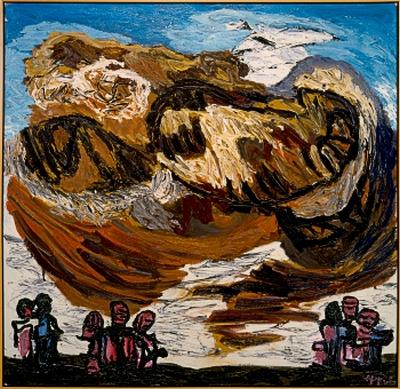
Clouds and People
Karel Appel
1984
_______________________
The Golden Age
Bill Knott
is thought to be a confession, won by endless
torture, but which our interrogators must
hate to record—all those old code names, dates,
the standard narrative of sandpaper
throats, even its remorse, fall ignored. Far
away, a late (not lost) messenger stares,
struck by window bargains or is it the gift
of a sudden solicitude: is she going to
lift up her shadow’s weight, shift hers
onto it? She knows who bears whom. In
that momentary museum where memory occurs
more accrue of those torturers’ pincers than
lessened fingernails, eyes teased to a pulp,
we beg for closeups. Ormolus, objets d’art!
A satyr drains an hourglass with one gulp.

photo - mw
_______________________
Five Poems
Maxine Chernoff
conjunctions
Event
“An event must in some way end before its narration can begin.”
—Christian Metz
And then doves and the thrush and the late
afternoon of the swallows under the bridge
and the fathoms of sleep and then the hollows
of dialogue aspiring to contain the rich facts
of what didn’t happen when it seemed to have,
and then a disquisition on the luster of windows
in the morning when a psalm is read
before lightning strikes the spire of a tall church
in the city of your birth, and then centuries
of robes of saffron or black and vespers or prayer
on cold granite or at a wall where guards
stand with AK-47s, and ghosts witness their attempts
with sorrow, unlike human sorrow, which is a stream
that evaporates when language interrupts its flow.
...(more)
_______________________

Space-Force Construction
1920-21
Lyubov Popova
b. April 24, 1889
_______________________
from A Time For Everything
Karl Ove Knausgaard
translated by James Anderson
The Winter Anthology
Antinous had been born in 1551 at ardo, a small mountain town in the far north of Italy, where in all likelihood he remained until he began to study in 1565. Apart from one particular event, to which he was to return time after time for the rest of his life, little is known about his early years. The names of his parents and native town do not figure anywhere in Antinous’s writings, and, as they are otherwise characterized by a large amount of biographical detail, this early obscurity has aroused the curiosity of many readers. But if one is to attempt to understand Antinous, it isn’t to the inner man one must turn. For even if one succeeded in charting his inner landscape as it actually was, right down to the smallest fissure and groove in the massif of his character, imperceptibly shaped by the slow erosion of events, and traced the course of the flood of feelings back to their source, one would end up no wiser and the meaning of what was being charted would remain obscure. Even if the events and relationships of his life were to correspond exactly with a life in our own time, one that we could understand and recognize, we would still come no closer to him. Antinous was, first and foremost, of his time, and to understand who he was, that is what must be mapped. The minimal emphasis we place on this difference is due perhaps in particular to the lasting influence of Freud, that speculative genius of the twentieth century, whose fatal confusing of culture with nature, combined with his equally fatal insistence on the external event’s inner consequences, has influenced our self-understanding more than anything else, and lured us so far away from our ancestors that we believe they were like us. But our world is only one of many possible worlds, something of which the writings of Antinous and his contemporaries serve to remind us in no small measure.
...(more)
The Winter Anthology
A collection of contemporary literature informed by history and older art, 21st century science and philosophy, and the ending of print culture.
An elegiac perspective.
An argument that the finest works of contemporary art are systems balanced at the edge of chaos, at the highest points of equilibrium between complexity and clarity.
An electronic collection until sufficient material for a print version accumulates.
_______________________

Willem de Kooning
b. April 24, 1904
_______________________
Framing Disability, Developing Race: Photography as Eugenic Technology
Jay Dolmage,
EXPLOSIONS
In this essay, I look back at photographs taken at Ellis Island in the very early part of the 20th century, an era, described by Barthes, as an age of explosions--explosions not only of population and immigration but also of the personal into the public and of technophilia, best metaphorized by the explosion of a camera’s flash bulb illuminating a new world. I am specifically interested in the ways that photography became a rhetorical tool of eugenicists and immigration restrictionists, and the ways that ideas about bodily fitness and defect drove the development of the technology.
In Cara Finnegan’s terms, I develop a “rhetorical history of the visual,” in that my project “relies upon critiques of vision and visuality to illuminate the complex dynamics of power and knowledge at play in and around images” (198). In terms of method, I take up Walter Benjamin’s call for studying photographs—in the age of mechanical reproduction—in terms of their production, reproduction, and circulation. Yet, I also attend to what David Bate calls the “surfaces of emergence” in that I focus on not just a group of photos, but also the connected practices, institutions, and relationships that must be considered when undertaking an archaeology of photography .
The photographs under study, I suggest, are emblematic of an important rhetorical moment—the emergence of the American eugenics movement. They are also charts of an important rhetorical space—Ellis Island. In crafting this “rhetorical history of the visual,” I thus specifically link these images to the rhetoric of eugenics and to the social and cultural construction of categories of race and disability in this era—categories that still adhere today. I specifically argue that these photographs ought be understood as products of a technology—photography—that created a new archive and index for sorting and classifying human bodies in this era. Indeed, Ellis Island, and the photographs taken there, actually helped frame and develop both race and disability, contingently.
...(more)
enculturation17: Open Issuea refereed journal devoted to contemporary theories of rhetoric, writing, and culture.
_______________________
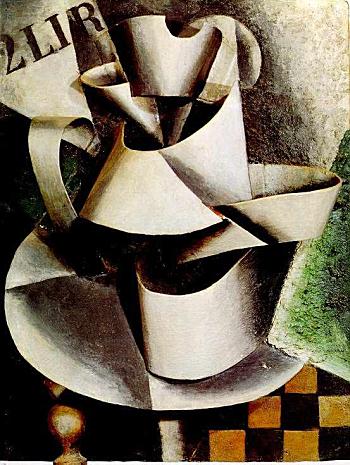
the jug on the table
Lyubov Popova
1915
_______________________
A Specter Is Haunting Precarity
Laura Goldblatt
(....)
Due to its lack of focus on the structural conditions of late capitalism—conditions that surely demand a more capacious understanding of the plight and figure of the precariat—precarity fails to consider the system in its totality. Because of these limitations, precarity as inscribed in the popular and academic press has become a way to maintain the status quo by creating a designation that largely includes only displaced professionals. These lapses make it difficult to organize around the conclusions the term draws because, as little more than a descriptor of the status quo, precarity can only compulsively reiterate these conclusions. And so, as Lenin so aptly put it over a century ago, what is to be done?
It is high time for displaced professionals to organize alongside of, strike with, and support fast food and other low-wage workers. Many intellectuals and others, for good reason, hesitate to get involved in these kinds of cross-racial and cross-class struggles: is this a kind of noblesse oblige, cultural imperialism, or racism under a different name, they ask. These are good questions and ones that must be asked relentlessly. But they should be asked, in my opinion, from within, rather than outside of these movements.
...(more)
_______________________

Joseph Mallord William Turner
b. late April - early May 1775;
_______________________
Dog’s Journey
Edie Meidav
conjunctions
I.
Waves lack surface when you are weak, nothing risen quickly enough to keep you up. Keep pulling toward midpoint between both islands where you could be lost but must keep going like a brute force of nature despite the dwindled sap in your arms. If you never had faith you find enough to say if this is what you have in store for me, either kill me this next moment or I will be your humble servant for the rest of my life. Strike me down now and let us not wait for jellyfish or sharks or else please stick by me and let me get there.
...(more)

photo - mw
_______________________
Dreamlives of Debris
Lance Olsen
conjunctions
:::: debris
I have my doll and the screamings behind my eyelids. The screamings look like fluttery lights. The fluttery lights believe they live inside me, but I live inside them too.
My doll’s name is Catastrophe.
(....)
:::: debris
I say once, I say now, I say hours, days, weeks, but I do not understand myself: Down here time is a storm-swarmed ship always breaking up.
(....)
:::: debris
Search as I might over the years, if one may call them that, and not something else—miscalculations, for instance—I have never ferreted out the guarded portal. Surely it exists in the same way, say, future dictionaries exist.
...(more)
The Complexities Of A Moment Felt: The Lance Olsen Interview
Interview by Scott Esposito quarterly conversation
_______________________

Nina Cassian
1924 - 2014
Two Poems
Nina Cassian
Summer X-Rays
Nina Cassian
I.
Fabulous days
with endless swims,
with algae around my waist
and convex tears on my cheeks.
Far away on the shore:
children shouting,
dogs with golden rings
circling their muzzles,
and rumors of abandoned memories.
I know what's awaiting me—
the winter of my discontent.
I have a reservation
outside on a hard bench
holding a bag of frostbitten potatoes.
That's why I swim so far out,
willing prisoner
inside the sea's immense green magnifying glass.
...(more)
_______________________

The Boat
Odilon Redon
c.1900
_______________________
Where next for media theory?
McKenzie Wark
Public Seminar Commons
Where next for media theory? I’m thankful to Geert Lovink for his recent provocation on this question. Lovink thinks we have entered a post-Snowden era of media. So called ‘new’ media is dead, just as God is dead. Or, to vary the frame of reference, the ebullient schizo era of anything could happen gave way to the paranoid reaction.
(....)
... unlike Lovink I can’t see the Snowden moment as all that decisive, but it is the case that the future once dreamt for ‘new media’ has been foreclosed. It is a victim of its success. Actually existing new media, like actually existing communism, falls short of the utopian projection. Its time to propose quite other futures, to locate other zones of virtuality from which other futures might seed.
(....)
In short: the point of media theory is – as Lovink suggests – a speculative one. But its task is not so much to fabulate futures as to describe in concepts what practices of relation, of pasts into presents and toward futures, could be.
Looking at the excessive arc of ‘new’ media since the nineties, I think we won the battle and lost the war. Social movements around free information and new community broke through the carapace of old media. We won! And then a new ruling class of figured out how to commodify our emergent gift economies at a higher level of abstraction. We lost! Well, too bad. Time to regroup and try something else.
This moment of defeat includes an inevitable return to the fantasy of a romance with the outside. Let’s leave social media behind! Let’s take no more selfies! Let’s only commune face-to-face while we sup on artisanal kale chips by the fire in our lumberjack shirts, brushing the crumbs from our flowing beards!
This is the problem with a lot of what I can only call late critique of media. It hasn’t learned a whole lot from media theory. It rests on the old saw of some organic, whole, romantic other that has been lost and can be restored. But as we have known since Donna Haraway at the latest: there’s no going back. We are made of media. We are made of technology.
...(more)
Hermes on the Hudson: Notes on Media Theory after SnowdenGeert Lovink e-flux
_______________________
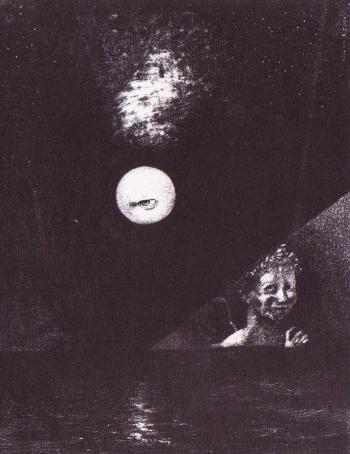
On the Horizon, the Angel of Certitude,
and in the Dark Sky, A Questioning Glance
Odilon Redon
1882
_______________________
It Is Time for the Violence and Gender Journal
Mary Ellen O'Toole
(....)
The mission of Violence and Gender is to identify and critically analyze biological, cultural, psychological, social, spiritual, anthropological, and environmental factors that influence males and even females to act violently. Are males, in fact, more violent than females? Do both sexes act out violently but in different ways? Are there different influencing factors that impact violent behavior for each sex? Violence and Gender will explore these questions and more by confronting controversial, even unsettling issues to determine the complex relationship between gender and violence.
Violence is complicated and too often misunderstood, myth-based, and stereotyped. We are shocked when we see the “nice guy” next door arrested for serial murder, or when the quiet loner goes on a shooting rampage. Many of us even default to using terms like “monster” and “evil” to explain such behavior and the people responsible. These archaic terms don't educate us or explain the violence but rather catapult us back into the 14th century when werewolves and vampires were blamed for acts of violence.
In the wake of September 11, and the event in Norway when Anders Breivik shot and killed 77 people, and more recently at the theater shooting in Aurora, Colorado, as well as the tragedy at Sandy Hook Elementary School in Newtown, Connecticut, and the bombings at the Boston Marathon, there has been an outcry for explanations as to why young males act so violently.
In light of these events and the resulting controversies, Mary Ann Liebert, president and CEO of Mary Ann Liebert, Inc., publishers, decided it is time to take on these critical questions about gender and violence. As a result of Mary Ann's insight and vision, Violence and Gender was created. Her goal of a journal that will be provocative, educational, and extremely insightful will be realized through her diverse staff of assistants, editors, experts, contributors, and readers.
...(more)
Violence and Gender 1:1
_______________________
The Rhetoric of Violence
Chris Hedges
_______________________

Spring
1883
Odilon Redon
b. April 20, 1840
_______________________
We no longer have public intellectuals; we have public idiots. Anybody with a story or a ‘game-changing’ idea can have some screen time, so long as it either deflects attention from thanaticism, or better – justifies it. Even the best of this era’s public idiots come off like used car salesmen. It is not a great age for the rhetorical arts.
Birth of ThanaticismMcKenzie Wark Public Seminar Commons
I don't know why we still call it capitalism. It seems to be some sort of failure or blockage of the poetic function of critical thought.
Even its adherents have no problem calling it capitalism any more. Its critics seem to be reduced to adding modifiers to it: postfordist, neoliberal, or the rather charmingly optimistic ‘late’ capitalism. A bittersweet term, that one, as capitalism seems destined to outlive us all.
I awoke from a dream with the notion that it might make more sense to call it thanatism, after Thanatos, son of Nyx (night) and Erebos(darkness), twin of Hypnos (sleep), as Homer and Hesiod seem more or less to agree.
(....)
Perhaps its no accident that the privatization of space appears on the horizon as an investment opportunity at just this moment when earth is going to the dogs. The ruling class must know it is presiding over the depletion of the earth. So they are dreaming of space-hotels. They want to not be touched by this, but to still have excellent views.
It makes perfect sense that in these times agencies like the NSA are basically spying on everybody. The ruling class must know that they are the enemies now of our entire species. They are traitors to our species being. So not surprisingly they are panicky and paranoid. They imagine we’re all out to get them.
And so the state becomes an agent of generalized surveillance and armed force for the defense of property. The role of the state is no longer managing biopower. It cares less and less about the wellbeing of populations. Life is a threat to capital and has to be treated as such.
The role of the state is not to manage biopower but to manage thanopower. From whom is the maintenance of life to be withdrawn first? Which populations should fester and die off? First, those of no use as labor or consumers, and who have ceased already to be physically and mentally fit for the armed forces.
...(more)
Public Seminar_______________________

Tête coupée
Odilon Redon
1878
_______________________
The Daily Growler Is 8 Years Old
(....)
So we sing "Happy Birthday" to ourselves as we poke our ways into the coming shenanigans by our idiot and totally corrupt leaders like Paul "the Pious Catholic" Ryan; Mitch "Old South Numbskull" O'Connell; Ted "Superstupid" Cruz; the twelve dumbasses on our Supreme(ly Dumb) Court (of jesters); Hillary "Presidential Wife Turned Inept Politician" Clinton; the corrupt Bushes; John "Bonehead" Boehner; our current President; and, if We the Stupidest People on Earth elect Hillary "Hillbilly" Clinton or (God help us) Jeb "the Reb" Bush, then we'll have four more years of poking our fat cats in their bulging bellies as they go about legislating totally anti-human, inane, polluting, rewards and more tax loopholes for the rich and famous and more deregulating what little regulations are left on our criminal corporations as they close down more American factories and send them over to Red China, or Communist Vietnam, or Taiwan, or India, or Brazil or they foreclose on more of our homes in order to return them to the communities as high-end rental units...we mean, to put it precisely, more of the same old bullshit.
...(more)
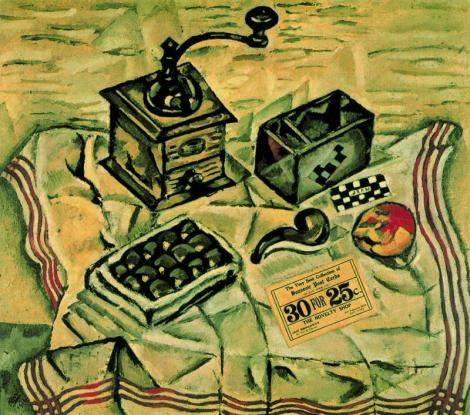
Still Life with Coffee Mill
1918
Joan Miró
b. April 20, 1893
_______________________
Leftism and the Banausic Thinker: From Plato to Verso
David Auerbach
waggish
This is an essay about defining one’s self as better than the world, as purer than the world. The urge to take your marbles and go home is a very old one, yet its role in art and politics is paradoxical, since taking your marbles and going home would seem to suggest that you will be ineffectual and unremembered. In fact, I think that is what happens most of the time. But the purist’s ability to survive latently in society owes to a peculiar form of elitism. Sometimes the elitism is obvious; other times it hides under a mask of ideology.
...(more)
_______________________
Andante and Filibuster
John Ashbery
Remember last month, when he was saying
doomed lovers’ syndrome uproots us all?
They all wanna hear that,
and hanging them out to dry slumpingly caresses
the center for new needs, and we’ll stiffen some near
the walled city and find 100 per cent electricity of the vote.
(Not sure about that.) Funny you should ask.
We got a small grant to have the house inspected and
as a result of that discovered a small crack
leading from the front door to the basement.
Much thinner air here, although the nation’s salt and pepper
sprinkle the neighborhood. Hose her down. Keep trying
to creep out, test ingot possibilities.
...(more)
Poems on Surveillanceboston review
John Ashbery
Charles Bernstein
Rae Armantrout
Richard Greenfield
Jennifer Kronovet
Maureen N. McLane
Cathy Park Hong
Robert Pinsky
Harmony Holiday
Noelle Kocot
Amy King
Jessica Baran
_______________________
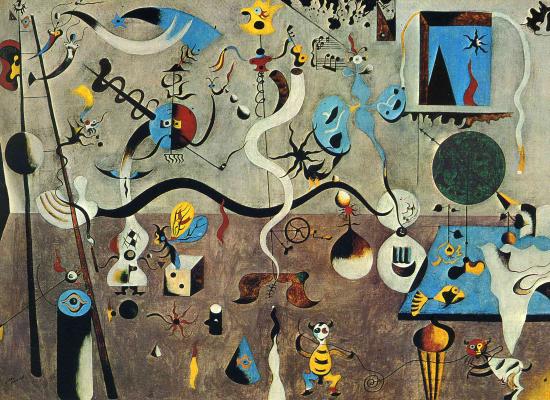
Harlequin's Carnival
Joan Miró
1924
_______________________
from The Iceland
Hagiwara Sakutaro
Translated from the Japanese by Hiraoki Sato
A Crow of Nihility
Hagiwara Sakutaro
translated from the Japanese by Hiraoki Sato
I was originally a crow of nihility
on that high roof of winter solstice I'll open my mouth
and roar like a weathervane.
Whether the season has epistemology or not
what I do not have is everything.
...(more)
Hiroaki Sato on Hagiwara Sakutaro
Asymptote
_______________________

The Birth of the World
Joan Miró
1925
_______________________
The Sponge of Sleep
John Ashbery
(....)
The woods are sorry for them.
Small rain will land somewhere.
...(more)
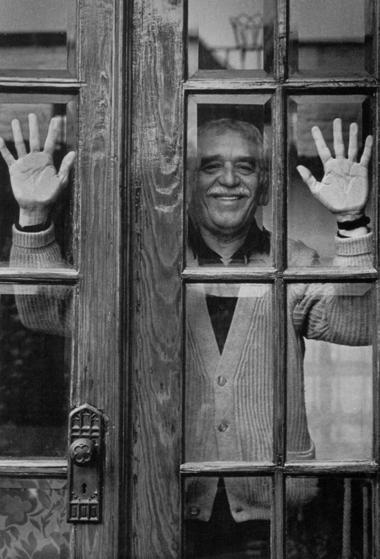
Gabriel García Márquez
March 6, 1927 - April 17, 2014
Graciela Iturbide - 1992 Read 10 Short Stories by Gabriel García Márquez Free Online
(Plus More Essays & Interviews)
open culture
_______________________
The April issue of Asymptote
The Space between Languages
Herta Müller
translated from the German by Julia Sherwood
(....)
There is not a single Romanian sentence in any of my books. But Romanian is always with me when I write because it has grown into my way of seeing the world.
It is from the space between languages that images emerge. Each sentence is a way of looking at things, crafted by its speakers in a very particular way. Each language sees the world differently, inventing its entire vocabulary from its own perspective and weaving it into the web of its grammar in its own way. Each language has different eyes sitting inside its words.
...(more)
Radka Denemarková on translating Herta Müller
translated from the Czech by Julia Sherwood
(....)
Her sentences are like the incisions of a scalpel. She keeps writing one book that runs like endlessly long hair; it sticks in the reader's gullet and can't be vomited up. The father she can no longer seek out, the mother she no longer wants. You can swallow a mulberry or a plum.
I did swallow it. I translated The Passport and The Hunger Angel after finishing my own novel, Kobold. For over two years, while I worked on my book, the difficult themes kept swelling up, infiltrating the language, cementing the banks of the story. When the time of intense brooding was over I was happy to shed the text, like skin. The exhausted writer in me was in dire need of a rest. I had never dreamt of translating. But the translator in me hastened to my rescue, deflecting my thoughts.
...(more)
_______________________
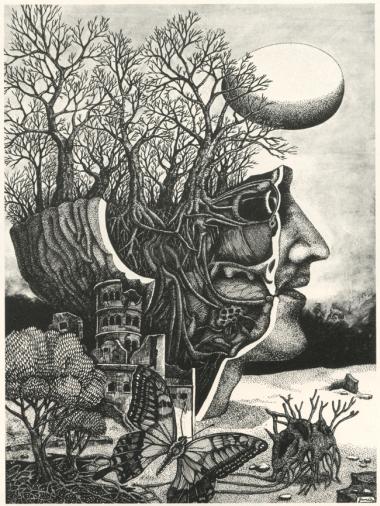
"My Head is a Garden"
Tadami Yamada
c.1975
Space Teriyaki 7
Visions of space and the future
in Japan in the 70s and 80s
50watts
_______________________
Samuel R. Delany on Close Listening
Samual R. Delany talks with Charles Bernstein about genres, sex, and dyslexia in this wide-ranging conversation with the polymathic author. Delany addresses the role of fantasy and the bounds of imagination in his works and rebuts assumptions about the nature of genre writing.
_______________________
The Un-X-able Y-ness of Z-ing (Q): A List with Notes
Sean Cotter
From Esther Allen, Sean Cotter, and Russell Valentino, eds., The Man Between: The Life and Legacy of Michael Heim, Translator
(....)
Milan Kundera opposed using "the unbearable lightness of being" to title the English translation of his Nesnesitelná lehkost bytí, even though it is relatively close to the Czech original. “I realize that for you Americans the title will be a bit hard-going," Kundera states in Michael Heim's account,
“so we can try something else,” and he suggested one of the chapter titles: “Karenin’s Smile.” I protested. “We’re not children,” I told the editor. “If The Unbearable Lightness of Being is the title, so be it.” And so it stayed. [Adriana Babeti, "A Happy Babel," Iowa Review]
Heim's translation, like a spot of dye, dropped into the flow of culture and altered the hue of English as it diffused downstream. A meme before memes, the breadth of this title's reach lets us see something we know is true but can rarely prove: translation choices transform our language and our experience of the world. The list in this essay is drawn from internet and library catalog searches of article, chapter, blog, and book titles for variations on the translation.
the unbearable lightness of meaning
the unbearable lightness of acting
the unbearable lightness of community
the unbearable lightness of exodus
the unbearable lightness of sight
the unbearable lightness of games
the unbearable lightness of the climate change industrial complex
the unbearable lightness of anthropology
Heim's gallant defense of American intellectual pride has been seconded, and thirded, and thousandthed, by writers who fit their own titles into the algebra of these abstract words. It has become an English given, a linguistic formula like Raymond Carver's "what we talk about when we talk about [x]" or R. F. C. Hull's "zen and the art of [x]." The English words that Heim poured into the Czech original have become the form where other authors cast their words.
the unbearable wine-ness of being a light
the unbearable busy-ness of being
the unbearable rambo-ness of being
the unbearable sade-ness of being
the unbearable panda-ness of being
the unbearable stuff-ness of being
the unbearable khaki-ness of being
the unbearable bro-ness of being
the unbearable wasp-ness of being
the unbearable clown-ness of being
the unbearable madness of being
Falling somewhere between pun and prayer, each repetition explores a possible application of the translated title to a new topic. En masse, they offer a visual, graphic testament to Heim's intuition of American culture and literary value....(more)
_______________________

Ludwig Meidner
b. April 18, 1884
_______________________
Matthew Zapruder: Two Poems
lemon hound
What Can Poetry Do
In Africa people are angry.
They are climbing embassy walls
and burning whatever is there.
Each time I click on some words
and read what we call news
although it is always too old
I feel certain some people
while I was reading have died.
I know I am here merely reading.
I just sit in my room and worry.
As always I can do nothing
So I close all the portals and go
deep in my mind to discover
something about Tunisia.
...(more)
_______________________
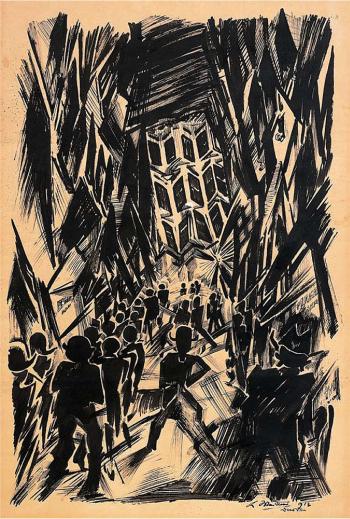 Dresden, 1913
Ludwig Meidner
_______________________
Civil disobedience for an age of total surveillance
The case of Edward Snowden
William E. Scheuerman
eurozine
(....)
... Sadly, one of our most eloquent critics of state surveillance now finds himself, partly because of the Obama's administration's draconian response, at the whim of a former KGB spymaster.[1] Recently, in Brazil, Germany and elsewhere, a lively debate has erupted about the possibility that Snowden – who only gained temporary asylum from the Russians – might now be granted asylum there.
Even though media sources have reported extensively both on his quest for asylum and his travails in Putin's Russia, they have failed to impart a satisfactory sense of the weighty moral and political reflections which apparently induced the then 29-year Snowden to give up his six-figure salary and comfortable life in Hawaii. As I hope to show, Snowden's public declarations – and especially an illuminating yet neglected statement he made at the Moscow Airport on 12 July 2013 when reluctantly accepting Russia's offer of asylum[2] – show that Snowden has thought long and hard about the fundamental question of when and how citizens of a liberal democratic state are morally and politically obliged to violate the law.
...(more)
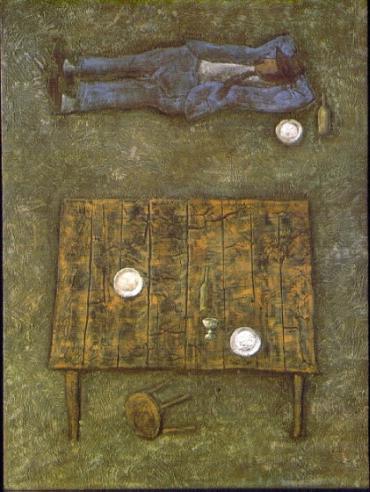 Domenico Gnoli
(3 May 1933 - 17 April 1970)
_______________________
The Sleepers
Walt Whitman
(....)
2
I stand in the dark with drooping eyes by the worst-suffering and the most restless,
I pass my hands soothingly to and fro a few inches from them,
The restless sink in their beds—they fitfully sleep.
Now I pierce the darkness—new beings appear,
The earth recedes from me into the night,
I saw that it was beautiful, and I see that what is not the earth is beautiful.
I go from bedside to bedside—I sleep close with the other sleepers, each in turn,
I dream in my dream all the dreams of the other dreamers,
And I become the other dreamers.
(....) 17
The homeward bound, and the outward bound,
The beautiful lost swimmer, the ennuyé, the onanist, the female that loves unrequited, the money-maker,
The actor and actress, those through with their parts, and those waiting to commence,
The affectionate boy, the husband and wife, the voter, the nominee that is chosen, and the nominee that has fail’d,
The great already known, and the great any time after to-day,
The stammerer, the sick, the perfect-form’d, the homely,
The criminal that stood in the box, the judge that sat and sentenced him, the fluent lawyers, the jury, the audience,
The laugher and weeper, the dancer, the midnight widow, the red squaw,
The consumptive, the erysipelite, the idiot, he that is wrong’d,
The antipodes, and every one between this and them in the dark,
I swear they are averaged now—one is no better than the other,
The night and sleep have liken’d them and restored them.
I swear they are all beautiful;
Every one that sleeps is beautiful—everything in the dim light is beautiful,
The wildest and bloodiest is over, and all is peace.
...(more)
.....................................................
Sleep as Resistance
Hejinian, Whitman, and more on the politics of sleep.
Siobhan Phillips
(....)
Sleep is strange—“[s]tranger than habit and than obsession,” Lyn Hejinian writes in The Book of a Thousand Eyes.
•
She could be talking about poetry. It’s an old connection, of course, older than the Romantics—who seem prescient, in the light of contemporary science, when they propose the jump-cuts of dreaming as a model not just for poetry but also for knowing, full stop. (“He awoke and found it truth,” Keats writes, comparing the imagination to “Adam’s dream.”) In The Book of a Thousand Eyes, published in 2012, Hejinian reconsiders. She wants to figure out what sleep can do for the chance of cognition. She also wants to test what sleep means for the promise of politics.
(....)
Another recent book, this one in prose, suggests an answer. Published last year, Jonathan Crary’s : Late Capitalism and the Ends of Sleep begins with the effect of digital culture on our sense of time. A world that is always “on”—the irony of “sleep” mode is that it avoids turning off a device—entices or requires humans to be the same. Gradually, we comply: we get less and less rest every night, we rise to check phones or tablets in the wee hours, we pretend work is leisure as we run the hamster wheel of social-media clicks. For Crary, a professor of art history, the life of digital timelessness manifests the most basic and inexorable drive of capitalism, which would shrink whatever is not producing or consuming. Sleep occupies that vanishing margin. Sleep does not want to be productive. “Sleep,” Crary writes, “poses the idea of a human need and interval of time that cannot be colonized and harnessed to a massive engine of profitability.”
...(more)
_______________________
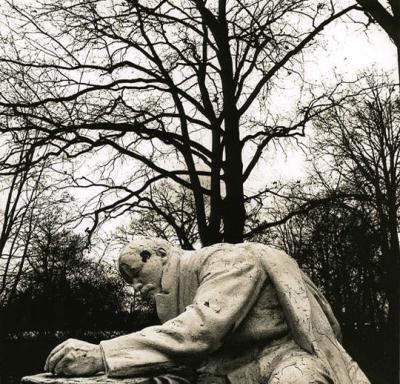
Nomenclatura of signs
Alexey Titarenko
_______________________
Nietzsche and the Burbs
How deeply we are lost! So deep that we do not know we are lost. How derelict we are! So great that we do not know our dereliction.
Boredom, deeper than anything even a Zen Buddhist would know. There are revelations here. Things to be seen. The absence of revelation. The absence of things to be seen.
Waiting – for what? Waiting for nothing. Waiting, become intransitive. Waiting, detached from all object.
The real drama is elsewhere. Everything is happening somewhere else. The suburbs: offstage. The suburbs: diversion. A kind of decoy.
...(more)
_______________________

City Sidewalk
Domenico Gnoli
_______________________
The half-life of disaster
Brian Massumi
(....)
... It is not so much that the horror is replaced by human warmth and its accompaniments. It is rather that it "decays" in the media. The horror transmutes into a different affective element, its intensity halved, then halved again, eventually reducing to trace levels. Globally, the event settles back into a more stable range of the periodic table of collective emotion.
(....)
Natural disaster and terrorism define the poles of disaster. In between stretches a continuum of disaster, a plenum of frightful events of infinite variety, at every scale, coming one after the other in an endless series. The media plays its role of affective conversion with a regularity that is as predictable as each event in the series, taken separately, is shockingly unforeseen. First the affective strike of the event is instantaneously transmitted, cutting a shocked-and-awed hole of horror into the fabric of the everyday. The ability to make sense of events is suspended in a momentary hiatus of humanly unbearable, unspeakable horror. Then comes the zoom-in to the human detail. Stories get human traction. The horror is alloyed, its impact archived. Another event has been affectively conveyed with irruptive, interruptive force, only to subside into the background of everyday life. What remains is a continuous, low-level fear. This fear doesn't stand out clearly as an emotion. It is more like a habitual posture, an almost bodily bracing for the next unforeseen blow, a tensing infusing every move and every moment with a vague foreboding. This trace-form anticipation – this post-shock pre-posturing – becomes the very medium of everyday life. The environment of life is increasingly lived as a diffuse and foreboding "threat environment". It is almost a relief when the next hit comes. It is only another bout of disaster that will enable the narrative balm to calm again the collective nerves of a humanity permanently on low-level boil.
...(more)
_______________________

photo - mw
_______________________
Adam
Federico García Lorca
Translated by Robert Friend
A tree of blood has stained the early dawn
where the new mother groans;
her voice has left sharp crystals in the wound
and on the window pane a print of bones.
While ever faithful, the arriving light
hushes to white boundaries of fable
the quiver of the veins in their flight
towards the opaque coolness of the apple.
And Adam dreams in the fever of his clay
of a child who galloping draws nearer
in the double throbbing of his cheek, towards day.
But a darker Adam in his dream is turning
towards a moon of stone, seedless and neuter,
where the child of light will be burning.
The Drunken Boat Fall 2013/Winter 2014
Centenery Feature
Robert Friend
1913 - 1998
_______________________

illustration for the first edition of
The Baron in the Trees
by Italo Calvino
(Il Barone rampante, 1957)
Domenico Gnoli
_______________________
6 Small Magazines You Need To Start Reading Right Now
BuzzFeed
|



































